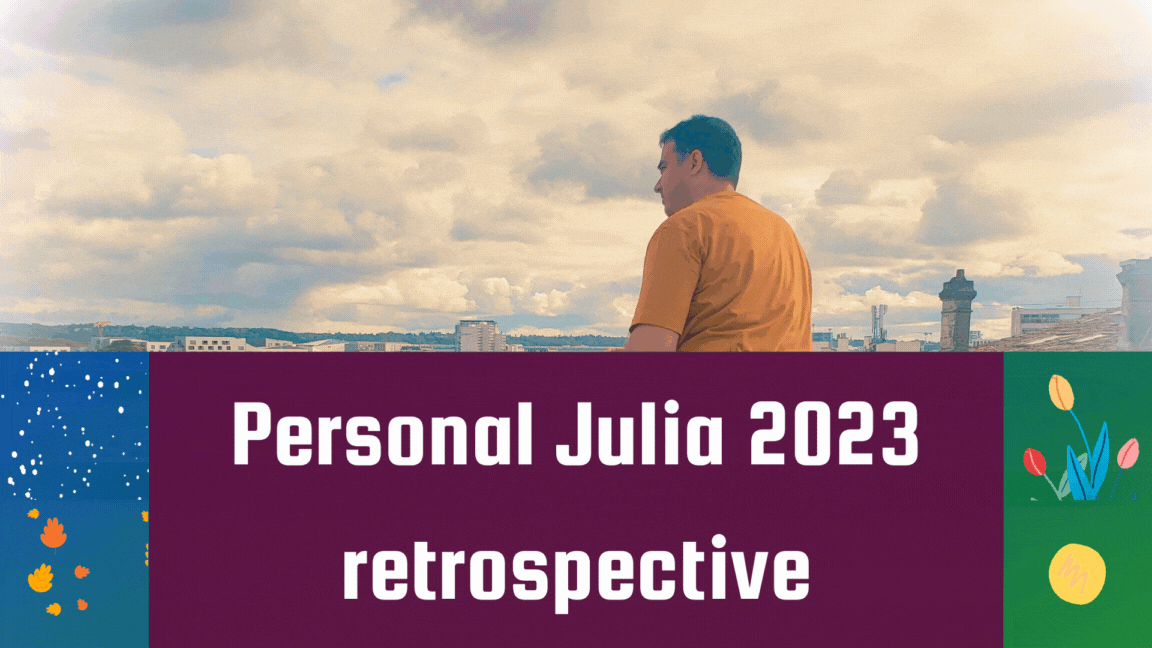2023 was a very interest year for me, regarding the use and promotion of the Julia Programming Language. Here are the three main reasons why.
First, I gave no less than 4 talks (not counting anything in-company).
On 19/January at the JuliaLang Eindhoven Meetup. I talked about the difficulties of maintaining a large ecosystems of packages. It was the first time I went to Eindhoven, and I met some great people there. These meetups are still happening around every 2 months.
On 6/October at the Julia and Optimization Days Paris, 2023. I presented current developments in the Julia Smooth Optimizers organization. I have co-created this organization as part of my research, and although my involvement has decreased since I left my professor position, I still keep tabs on a few packages. So I was lucky to be a spokesperson for our organization at this event. It was great to meet some old friends and acquaintances from the optimization field, and it was also my first time in Paris.
On 10/November at the Colombia Data Summit 2023 (Remotely). I was invited to talk about Julia in some way related to AI. Naturally, I used the chance to compare and contrast optimization and data science, and to talk about Julia in general and for optimization. Luckily, this talk was recorded, so you can watch it here and let me know what you think. I used bits from older lectures in optimization, since I was not sure how much my audience was familiar with the subject, but I had a lot of fun updating the examples.
On 1/December at the JuliaCon Local Eindhoven 2023. I once again talked about Julia Smooth Optimizers, but this time I focused on users, since the audience were from more diverse background. I also challenged myself to add a meme (or at least some image) in every slide. I know that most were not very funny, but I also had to prepare the talk. Maybe next time I will do something completely new, like using only Seinfeld screenshots. This talk was also recorded, so you can check it out here. This was the first JuliaCon Local, i.e., a local variant of JuliaCon. So far it is the only JuliaCon Local, although I expect that will change in 2024. I don’t know about official numbers, but I think there were around 200 attendees. It was great to have a taste of JuliaCon 2024, which will also be in Eindhoven, at the PSV stadium, no less.
I am not new to giving talks, but to have 4 in an year outside of academia was a bit unexpected. I hope to present at some events in 2024 as well, however probably not as many - ask me again next year.
Second, Julia usage and interest inside the eScience Center increased a lot.
Since I joined the Netherlands eScience Center in 2021 as a Research Software Engineer, my involvement with Julia programming had been decreasing. Before, I was a professor in Brazil and over 95% of my research and teaching was using Julia, so I used Julia daily. I joined the eScience Center as a generalist, so I worked in Python, Javascript/Typescript, C++, and even Kubernetes. However, I have been slowly trying to engage more people into Julia:
- I wrote a few blog posts.
- I co-organized a Julia for HPC Webinar.
- I talked internally about advantages of using Julia.
- I organized internal crash courses.
It finally paid off. I was asked to consult briefly to compare JuMP/Julia to other modeling languages, and by its own merits, JuMP was selected as the modeling language for an energy model that the eScience Center is developing together with TNO. Naturally, it is great to work almost daily with Julia again, but more than that, I have a chance to work closely with people that know a lot about energy, optimization, project management, and working as a team.
Furthermore, there is now a good number of colleagues interested in, or already using, Julia, and we might have 3 or 4 Julia projects this year. I expect to have periodic meetings in 2024, but let’s see what happens.
Third, I started doing general YouTube Julia videos in English.
When the Covid epidemic caused Brazil to shutdown, I moved my classes online - as most professors. I chose to record a lot of my material and make it available on YouTube, which meant that a had dozens of Julia YouTube videos by the end of 2020. Almost everything was in Portuguese, though, so my international reach was limited to some Julia Smooth Optimizers tutorials.
In 2023, I decided to make more general Julia videos in English. I started two series:
- Julia Journey: Juggling Jargons Joyfully, which serves as an introduction to Julia.
- Mathematical Modeling, talking about optimization problems and solving them with JuMP.
I also created some “random” videos:
- Best Frenemies: Julia and Python, talking about using Julia and Python together;
- Julia Language Cannot Even Handle Simple Math, which is a clickbait video focusing on one of the most asked questions when dealing with floating-point numbers;
- Solving an RPG puzzle with Julia, modular arithmetic, and linear algebra, a very interesting nerdy application of Julia to solve a simple puzzle in a very complicated way.
There will be more videos, and you are free to request specific topics - doesn’t mean I will make them, but it is good to gauge the interest.
Thanks for reading, and keep tuned for what happens in 2024.
